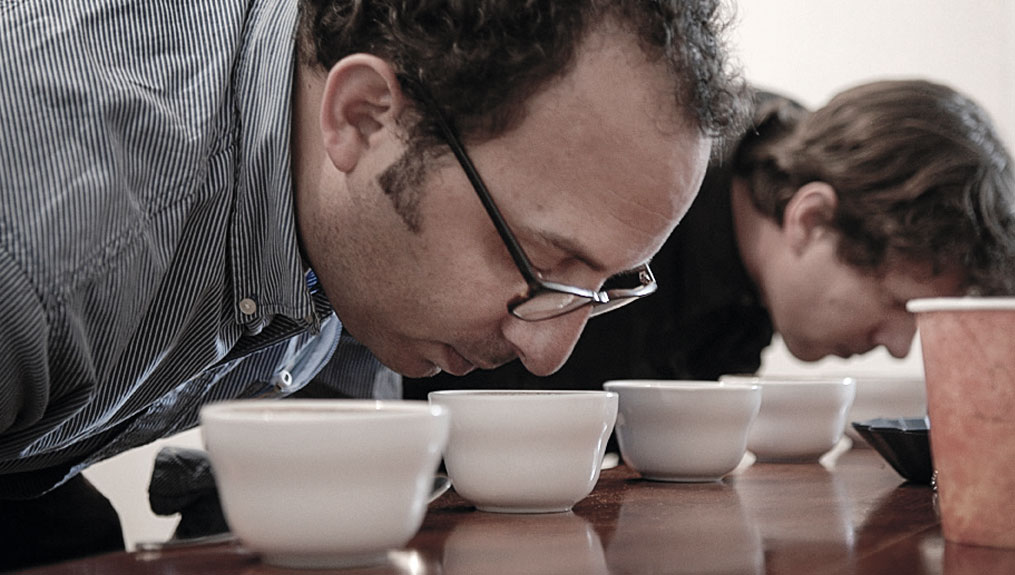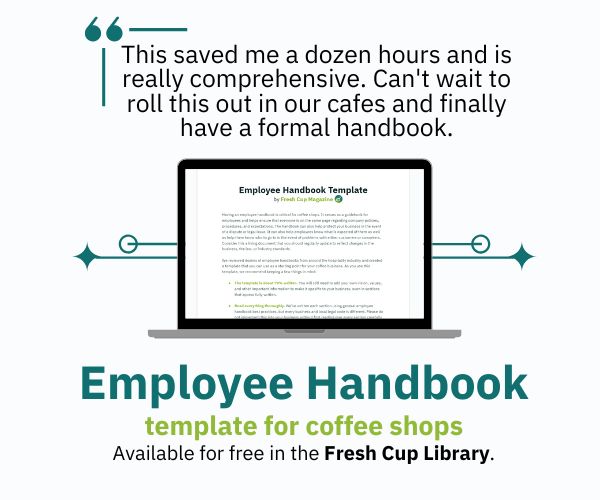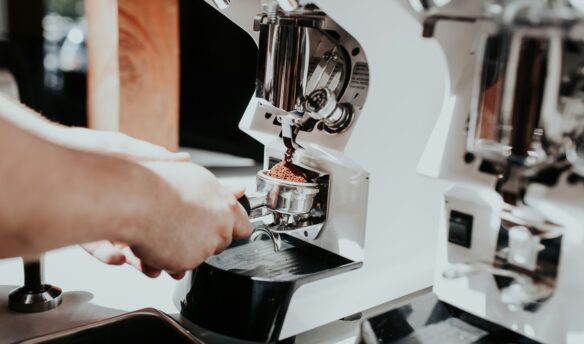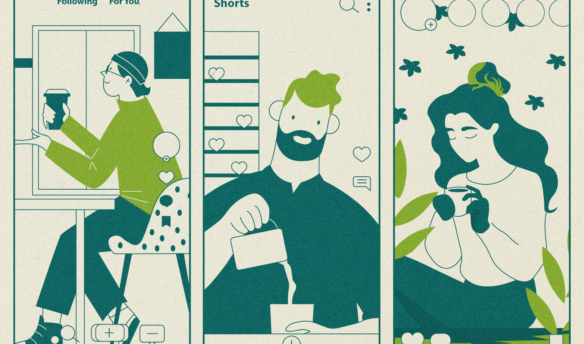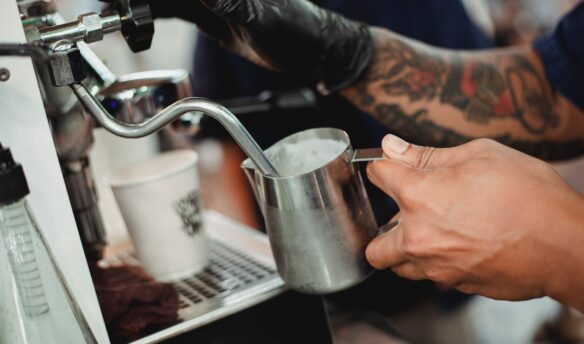Peter Giuliano is the Chief Research Officer of the Specialty Coffee Association (SCA) and Executive Director of the Coffee Science Foundation (CSF).
Fresh Cup caught up with him as he prepared, along with the SCA, to launch Re:co 2020, which is entirely digital for the first time. We talked about what to expect, what’s new with a cold brew research project by the CSF, and why his coffee routine has changed with COVID-19.
Fresh Cup : Thank you for agreeing to speak today ahead of Re:co. As a longtime professional in the industry, in what ways is Re:co important and essential to the SCA and the industry as a whole?
Peter Giuliano: The roots of Re:co started 12 years ago when we realized we needed a place for coffee leaders to come together and talk about research, science and economics, and these big picture things. And it was funny, our timing those 12 years ago…we had this idea during the summer, and then in the fall of that year was when the economy crashed in the 2008 economic crisis.
What we realized was it really underscored the importance of having a group of people who wanted to do leadership and coffee coming together to talk about these big subjects.
Over the years, we’ve sort of evolved this idea and continue to expand it. And really what it is, is a place where current and future leaders come together to talk about the state and future of the coffee, especially the specialty coffee industry. We try to create a space where these people can come together and share ideas and discuss.
FC: Re:co this year will be entirely digital. What can attendees expect with Re:co taking this direction this year in response to COVID-19?
PG: One thing that I think most people know about Re:co is the talks, and those can be seen on YouTube. We think of that as information sharing—people coming up and sharing what they know with the rest of the community. This year, we put those together, but it was really important that it not take the form of yet another webinar or Zoom meeting, you know? Most of the talks that we’ve got are actually prerecorded so they look different and they feel different. We’ve worked hard to make them engaging cause we know that Zoom fatigue is real.
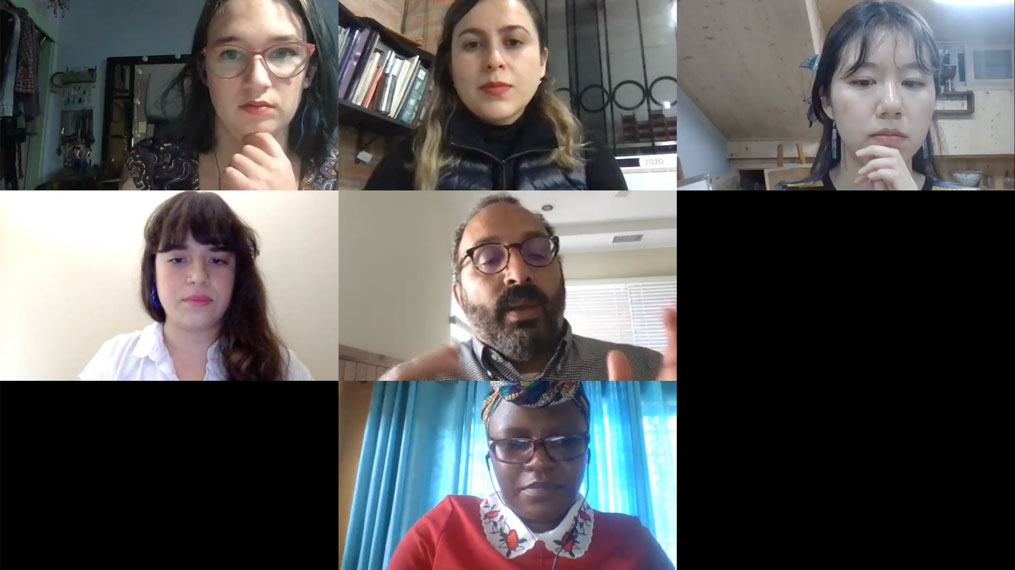
That’s only one part of what Re:co actually is because what we know is that people come to Re:co to find people to engage with…that idea that you meet somebody because they’re sitting next to you at Re:co. That becomes a relationship for you for the rest of your coffee career. We know that that happens, so we wanted to create a digital space for that. There will be discussion rooms that are happening and we have created a LinkedIn community to foster professional engagement. We’re going to be using that to help foster sort of professional engagement and connection.
The third thing that happens that’s really important is the sensory and coffee experiences.
We work with coffee professionals to really deliver a special coffee experience…We actually really curate the coffee experience and try to make the coffee experience at the conference connected to the stuff that we’re talking about. We had to do that, but in the virtual environment. We also have had a tradition of doing sensory experiences, [because] coffee is made special by the way it tastes. Coffee people are flavor people. So we’ve always had a sensory experience area as part of Re:co and now that both experiences are digital, for the people that signed up in time, we created a box that has brewing devices in it, multiple coffees and multiple sensory experiences that we curated in a box this week arriving at people’s houses. And then during the conference, we’ve got a place called The Virtual Experience Hall where you can go drink coffee and be led through tasting experiences and these live sensory science experiments that are happening while people prepare their coffee at home and then participate in these kinds of experiments and experiences as part of it.
FC: Can you tell us about your involvement with the Coffee Science Foundation and the status of its new cold brew research project (“Towards a Deeper Understanding of Cold Brew Coffee”) that began at the beginning of this year?
PG: We have started the research at UC Davis. The timing was so weird because of COVID-19. It’s been strange but there have been some silver linings.
The way that these research projects work is there’s what’s called a PI, a principal investigator, that actually we make the research agreement with. We have two—William Ristenpart, a chemical engineer who is speaking at Re:co this year, and Jean-Xavier Guinard, who is the sensory scientist who will also be speaking in Re:co this year. They’re the leaders of this cold brew project, and their title should give you an indication of what our strategy is. There’s a chemistry component where we’re trying to figure out what’s happening at the chemical level with cold brew as it goes, and what makes it from a chemical perspective and what the differences between cold brew and hot brew are. And furthermore, what’s the difference between cold brew at 20 degrees Celsius versus cold brew at three degrees Celsius, which is refrigerator temperature. So asking, “Is there a chemical difference between cold brew in your refrigerator versus cold brew brewed on your countertop?” We know that there is, but we seek to characterize that from a chemical perspective. And we’re going to go through and do a bunch of sensory research on what that means for flavor. That is two phases.
The sensory research had to be postponed because COVID. You do sensory research using tasting panels, who come together physically in a room…so that obviously had to be postponed. The chemistry did not.
A project like this usually is slated to take about two years. It is a methodical process and we’re just at the very beginning.
FC: What conversations would you like to see in the industry in the future?
PG: I’ve got a research bias…you can probably guess that. That’s where my passion is and that’s one of the things that I love most about Re:co is that it’s a place for people to share their research and not only what their opinions are about things, but what they know about things. There’s a lot that we still don’t know about.
You’ve mentioned the Coffee Science Foundation—before it was established to answer a lot of the things that we don’t know about coffee, meaning we don’t know what the chemical differences between the hot brew and cold brew…we don’t know what the sensory differences, we all have opinions about that, but we haven’t quantified that.
You ask about the future—we don’t know a lot about the social sciences. From sociology, anthropology, and history…can these help us? I am eager to do more of that research where we learn about and talk about at places like Re:co…where we take a hard look at ourselves as an industry…by looking at some of the ways that we are the way that we are and how we can be better as an industry. What is interesting to me at the moment is unpacking things like the colonial history of coffee and how that impacts us today and how understanding that can help us do better as an industry.
FC: How would that research look like if that does become a reality?
PG: We hope to engage and develop some industry support in the next coming months. We have to have industry support, usually financial support, to help us to achieve these things. From there, we can begin engaging with historians and sociologists to start to understand and do publications for the industry.
FC: Fun question time: What coffee routine are you enjoying lately, or one that started with quarantine?
PG: It’s interesting. This is going to seem weird, but I thought when quarantine started, I speculated people would drink way more coffee at home than when they are at work. That’s always been true for me. For some reason, when I am home, it is just as easy to make in the office as it is at home, but I find myself consuming less coffee because of the anxiety.
In terms of my routine, I am making less coffee for myself but I treasure it more. The hour of my day before my children wake up and before my work day starts, that time to make coffee thoughtfully has become so much more precious to me. It is meditative, silent, and rewarding in that sense. What coffee means to me now is dissimilar from six months ago.
Catch Re:co on Thursday, July 16, and Friday, July 17. Registration is still open and can be found here.

